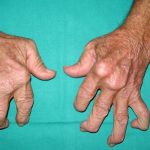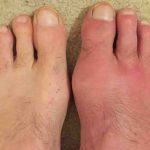Cramping and Muscle Weakness
Mentioned earlier, muscle cramping and weakness is usually what people will first notice, and this often leads to the discovery of mild hypokalemia. The reason you get muscle weakness and cramping is because potassium is necessary for proper muscle contractions. If you are low in potassium, the muscles will not only lose the ability to fire properly, but they won’t be getting enough nutrients to stay toned either. This may cause difficulty when holding objects or even when walking.

Twitching and cramping will vary. Oftentimes, the spasms occur in the legs. As levels continue to drop, muscle paralysis is possible. When the paralysis moves from the lower extremities into the chest, the diaphragm, which assists with breathing, can freeze up and the risk of respiratory failure skyrockets.
More from Things Health
-
Symptoms Of Rheumatoid Arthritis
Rheumatoid arthritis is a chronic autoimmune illness, which accompanies irritation of the joints and apparent deformities. Maybe a virus, causes an attack on the synovium…
-
Symptoms Of Ovarian Cancer
Ovarian cancer is often referred to as a quiet disease as it usually isn't discovered until it is in the advanced phases. In nearly all…
-
Symptoms Of A Sinus Infection
Every year, millions of individuals suffer from sinus infections. A sinus infection is merely an irritation or infection of the sinus cavities. The sinus cavities…
-
Symptoms of Gout
Gout is a form of inflammatory arthritis characterized by recurrent attacks of a red, tender, hot, and swollen joint. Pain typically comes on rapidly in…
-
Symptoms Of Epilepsy
Epilepsy a neurological disorder marked by sudden recurrent episodes of sensory disturbance, loss of consciousness, or convulsions, associated with abnormal electrical activity in the brain.…

















